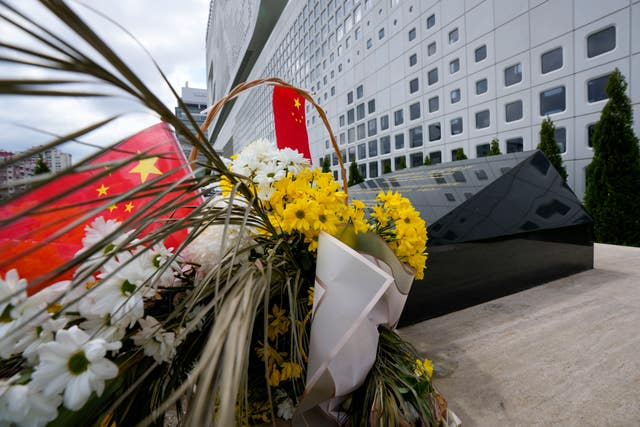Chinese leader Xi Jinping’s visit to European ally Serbia on Tuesday falls on a symbolic date: the 25th anniversary of the bombing of the Chinese Embassy in Belgrade during Nato’s air war over Kosovo.
US jets dropped five bombs on the Chinese Embassy compound in the Serbian capital on May 7 1999, setting it ablaze and killing three Chinese nationals.
Twenty other people were injured in the incident, which has burdened relations between the two powers ever since.
The Western military alliance had launched the air war in March that year to force then Serbian strongman Slobodan Milosevic to end a brutal onslaught against ethnic Albanian rebels in Kosovo.
The US at the time apologised and said the embassy bombing was a mistake that happened due to faulty intelligence.
The intended target, Washington said, was the headquarters of a Serbian state arms exporter located on the same street, a few blocks away.
“Imagine that somebody would, even by accident, strike an American Embassy somewhere around the world.
“The reaction would be immediate,” said Sven Biscop, a professor of European foreign and security policy at the Ghent University and Egmont Institute.
“So for a country like China, it is also clear that this is a big thing,” he added.
“And, of course, it has not been forgotten.”
Mistrust over the incident has endured to this day.
“We will probably never really conclusively know either way,” Mr Biscop said.
“But one thing is sure. In war, incidents like that do happen, and I usually tend to go for the most simple explanation rather than try to invent complicated theories.”
While straining Beijing’s relations with the US, the embassy bombing brought China and Serbia closer together.
China has emerged as Serbia’s largest provider of foreign direct investment and its second-largest trading partner after the European Union.
Beijing opposed the Nato bombing campaign and has since backed Belgrade’s bid to counter the Western-backed push for independence in Kosovo, a former Serbian province.

Signs of pro-China sentiments were clearly visible ahead of Mr Xi’s visit on Tuesday and Wednesday.
In Belgrade, a huge Chinese flag was placed on a skyscraper along a roadway leading into the city from the airport.
Smaller Chinese and Serbian flags could be seen downtown and along a highway.
Mr Xi will arrive from France and proceed from Serbia to Hungary as part of his first European tour in five years.
He is expected to visit the site of the former embassy on the anniversary date and pay his respects to the bombing victims.
A Chinese cultural centre now stands at the spot where the embassy was once located.
The sprawling complex reportedly includes a Confucius Institute, workshops, exhibitions, offices, residential space and a hotel.
It is seen as a symbol of China’s growing influence in Serbia and across Europe.
Near the institute, a group of visitors from China last weekend bowed in front of a simple black-marble monument and laid flowers in honour of the victims of the 1999 bombing.
An inscription on the monument in both Chinese and English reads: “Honour Martyrs, Cherish Peace.”

